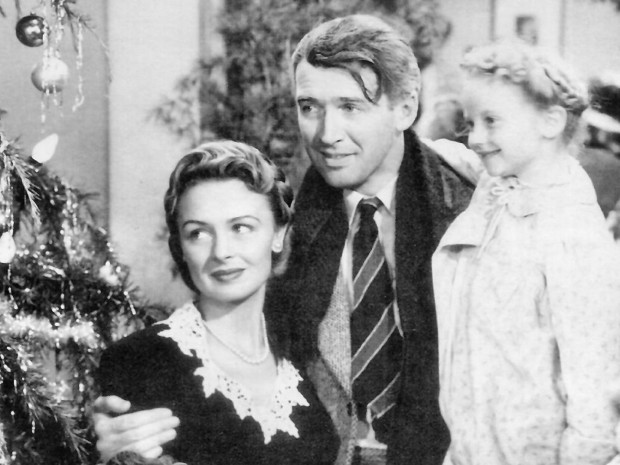THE EXTRAORDINARY CENSORSHIP OF “IT’S A WONDERFUL LIFE”
by James Perloff, Jamesperloff.com:

Although the holiday season is behind us, I believe there are some remarks long overdue concerning the suppression of It’s a Wonderful Life, arguably America’s most beloved Christmas film of all time.
I first became aware of the movie nearly half a century ago when I was around 20. A local station happened to air it, in no connection with Christmas. It’s a Wonderful Life was, at that time, just another piece of forgotten cinema, not regarded as “a holiday classic.”
Yet even though I was a jaded agnostic youth, I found myself weeping uncontrollably as the life of Jimmy Stewart’s character fell apart. And I was a person who almost never cried at the movies. But there was something so endearing about George Bailey, it transcended the emotional barriers of all but the most hardened cynic.
When the movie was over, I knew I had experienced something special, several cuts above “standard Hollywood fare.” For me, the breaking point was when George began kicking and smashing things in full view of his children. It was a display of vulnerability that just wasn’t seen in Hollywood, where heroes were perennial tough guys with none of the everyday human “chinks in the armor” that the rest of us have.
Late in his life, Hollywood paid tribute to Stewart at a special dinner. I’ve been unable to find a video of that televised event, so please pardon me for going on memory here. Dustin Hoffman actually broke down and wept as he recalled Stewart’s performance in It’s a Wonderful life. But the remarks by actor Telly Savalas etched themselves most in my memory.
Savalas had largely grown up as a streetwise New Yorker (a background that would later serve him well when he took on his most famous role, that of Lieutenant Theo Kojak). According to Savalas, he and his buddies entered the theater showing It’s a Wonderful Life in their accustomed manner—sneaking in the side exit without paying. However, the film’s impact was so great, that when it finished they all sheepishly went to the ticket window and paid for their admission. It’s a Wonderful Life had a way of bringing out personal integrity, and personal integrity is something you just don’t mess with.
By the 1980s it seemed like everyone had discovered the film. During the Christmas season, it would air hundreds of times on local television stations. I took my father and sister to see it on the big screen at the famed Coolidge Corner Theatre in Brookline, Mass.
Then, disaster struck. After legal battles over controversial copyright issues, NBC acquired control of the film in 1994. Since then, NBC has twisted the screws tight. Not only is no one else permitted to televise the film, but NBC usually only screens it once a year—on Christmas Eve, riddled with so many commercials that people are discouraged from watching. As the film reaches its climax, ads are inserted with increasing frequency, disrupting the movie’s emotional flow. It got so bad that one year my son turned off NBC and inserted an old VHS tape we had of the movie.
Some will say that permitting only one annual screening makes the film “more special.” That’s kind of like saying you should only hug your children once a year because it makes hugs more special.
The unique restrictions on the film do not make sense from a business or marketing perspective. If you have a product that is in high demand—whether it is sneakers, a smartphone, or an energy drink—you produce more of them, to meet the demand and increase your profits. Because It’s a Wonderful Life is in high demand, NBC could easily increase its advertising revenues by showing it more often, or lease screening rights to other broadcasters. The movie is, in fact, ranked as the number one most inspiring film of all time by the American Film Institute.
I realize that we live in a multimedia world, and that people still have the option to buy a DVD or download. One could argue that is NBC’s marketing strategy. But to market a product, you need to make it visible.
This past Christmas Eve (2018), I was curious to know what was going on with It’s aWonderful Life. I found it was not airing as usual on NBC. Instead, it had been back-doored onto a secondary channel, NBC10, which most people probably didn’t even know.
In short, It’s a Wonderful Life is being progressively flushed down an Orwellian memory hole until future generations will hardly even know of the film’s existence. Since no business model can logically explain NBC’s antipathy toward its own intellectual property, we must look elsewhere for an explanation. Anyone familiar with the realities of today’s Hollywood knows that ideological agendas, not box-office profits, are the true bottom line.
I suggest that It’s a Wonderful Life has been suppressed for the following reasons:
(1) It contains redeeming values despised by the Luciferian New World Order, such as love, self-sacrifice, traditional family, and the value of human life;
(2) it validates the existence of God, and within a generally Christian framework (heaven, angels, prayer, Christmas caroling); and
(3) the film’s arch-villain is a usurious bankster who oppresses and threatens to destroy the culture around him, just like today’s banksters are actually doing.
Small wonder then that NBC, a mainstream media organ and handmaiden to the oligarchs, is doing its best to send It’s a Wonderful Life into oblivion.
1946: Best Picture? Best Actor?
Another question arises: Why did It’s a Wonderful Life fail to earn the 1946 Best Picture Oscar? I believe the reasons were just as political back then as now.
“Best Picture” went to The Best Years of Our Lives, about the postwar problems of three GIs returning home. While it definitely had strong production values, and a very memorable performance by Harold Russell, a real-life GI who had lost both his hands in an accident during the war, the movie lacked the deep enduring spiritual power of It’s a Wonderful Life. I know the film has admirers to this day, and I don’t wish to “dis” it, but I’d like to point out some probable dynamics that influenced the Oscar choices.
As a writer, I’m aware that it’s often the subtexts, not the main plot, that are a movie’s real reason for existence. I used this tactic myself in the mid-1990s when I penned a screenplay that was optioned twice but never made into a film. The main plot was an action-mystery buddy movie, but one scene included a defense of Christianity, woven into the dialogue so subtly that it never looked like anything but a natural development in the plot. But in reality, that bit of dialogue was the screenplay’s object; everything else was written to accommodate it.
In the case of The Best Years of Our Lives, I believe the subtexts are the likeliest reason for the “Best Picture” Oscar, especially insertion of a little political scene with minimal relevance to the main plot. I, of course, own no rights to The Best Years of Our Lives; the scene was uploaded onto YouTube two years ago by someone else; I include it here solely for purposes of critical review; and for reader convenience, I am embedding it instead of redirecting people offsite to YouTube:
Loading...



